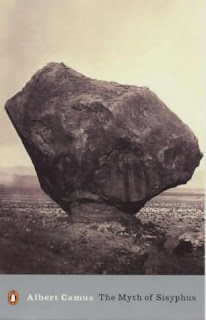

In the grand scheme of things, we cannot comprehend ourselves and our actions do not mean anything. The absurd also involves the knowledge and understanding one has. “For if I try to seize this self of which I feel sure, if I try to define and to summarize it, it is nothing but water slipping through my fingers.”, essentially, the world resists any attempts of appropriation. Camus further explains that habits cover up the obscure character of the world, where the world might seem as though it serves one’s purpose, the world really has nothing to do with one’s purposes, desires or interests. Here Camus explains that one can only become conscious by asking themselves ‘why’ they are doing what they are doing, usually this happens when one is unhappy, Camus expresses often in “The Myth of Sisyphus” that the human experience is not an easy one.

Camus wrote about routine and waking up, “Rising, street-car, four hours in the office or factory, meal, street-car, four hours of work, meal, sleep, and Monday, Tuesday… According to the same rhythm – this path is easily followed… but one day the ‘why’ arises and everything begins in that weariness tinged with amazement”. The absurd is the realization that the world exists independently from any meaning that one attempts to give it. Here Camus is talking about the primitive hostility of the world, how dense and strange it is. That stage scenery masked by habit becomes again what it is”. Camus wrote that “the world evades us because it becomes itself again. The absurd is described as the gap between oneself and one’s senses, who one thinks they are and the resistance of the world to human endeavors. Algeria, Angola, Argentina, Australia, Bahrain, Benin, Bermuda, Bolivia, Botswana, Brazil, Brunei Darussalam, Burkina Faso, Burundi, Cambodia, Cameroon, Canada, Cape Verde Islands, Central African Republic, Chad, Chile, Colombia, Comoros, Côte d'Ivoire (Ivory Coast), Democratic Republic of the Congo, Djibouti, Ecuador, Egypt, Equatorial Guinea, Eritrea, Ethiopia, Falkland Islands (Islas Malvinas), Gabon Republic, Gambia, Germany, Ghana, Greenland, Guinea, Guinea-Bissau, Guyana, Hong Kong, Indonesia, Iraq, Israel, Japan, Jordan, Kenya, Kuwait, Laos, Lebanon, Lesotho, Liberia, Macau, Madagascar, Malawi, Malaysia, Mali, Mauritania, Mauritius, Mayotte, Mexico, Morocco, Mozambique, Namibia, New Zealand, Niger, Nigeria, Oman, Paraguay, Peru, Philippines, Puerto Rico, Qatar, Republic of the Congo, Rwanda, Saint Helena, Saint Pierre and Miquelon, Saudi Arabia, Senegal, Seychelles, Sierra Leone, Singapore, Somalia, South Africa, Suriname, Swaziland, Taiwan, Tanzania, Thailand, Togo, Tunisia, Turkey, Uganda, United Arab Emirates, United Kingdom, Vietnam, Virgin Islands (U.S.The absurd is a theme that much of Albert Camus’ work revolves around.


 0 kommentar(er)
0 kommentar(er)
